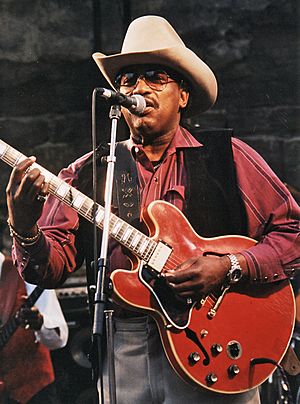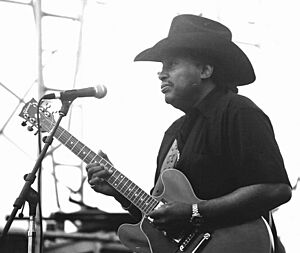Otis Rush facts for kids
Quick facts for kids
Otis Rush
|
|
|---|---|

Rush at the Notodden Blues Festival, Norway, 1997
|
|
| Background information | |
| Birth name | Otis Rush Jr. |
| Also known as | Little Otis |
| Born | April 29, 1934 Philadelphia, Mississippi, U.S. |
| Died | September 29, 2018 (aged 84) Chicago, Illinois, U.S. |
| Genres | Blues, Chicago blues, R&B |
| Occupation(s) | Musician, singer, songwriter |
| Instruments | Vocals, guitar |
| Years active | 1956–2003 |
| Labels | Cobra, Chess, Duke, Vanguard, Cotillion, Bullfrog, Black & Blue, P-Vine, Delmark, Sonet, Blind Pig |
| Associated acts | Buddy Guy, Magic Sam, Eddy Clearwater, Willie Dixon, Jesse Fortune |
Otis Rush Jr. (born April 29, 1934 – died September 29, 2018) was an American blues guitarist and singer. He was famous for his special guitar style. It had a slow, burning sound and long, bent notes.
His music, along with other artists from the 1950s like Magic Sam and Buddy Guy, helped create the "West Side Chicago blues" sound. Many famous musicians, including Michael Bloomfield, Peter Green, and Eric Clapton, were inspired by him.
Otis Rush was left-handed and played his guitar that way. However, he strung his guitars upside-down, with the lowest string at the bottom. Many people believe this unusual way of playing helped create his unique sound. He also had a strong, wide-ranging singing voice.
Contents
Early Life and Music Beginnings
Otis Rush was born in 1934 near Philadelphia, Mississippi. His parents, Julia Campbell Boyd and Otis C. Rush, were farmers. Otis was one of seven children and worked on the family farm when he was young.
When he was eight years old, Otis taught himself to play the guitar. He also sang in church choirs in his local area.
Music Career
In 1948 or 1949, Otis Rush moved to Chicago. He was inspired by the famous blues musician Muddy Waters. Soon, Otis started playing in blues clubs on the South and West Sides of Chicago. He quickly became well-known.
During this time, he formed his own music group, first called Little Otis. From 1956 to 1958, he recorded songs for a small record company called Cobra Records. He released eight singles, which are records with one song on each side. Some of these songs featured other guitarists like Ike Turner or Jody Williams.
His very first single, "I Can't Quit You Baby", became a hit in 1956. It reached number 6 on the Billboard R&B music chart. While at Cobra, he recorded some of his most famous songs, such as "Double Trouble" and "All Your Love (I Miss Loving)".
New Record Deals and Touring
Cobra Records closed down in 1959. In 1960, Otis Rush signed a new contract with Chess Records. He recorded eight songs for them. Some of these songs were later put on an album called Door to Door in 1969.
In 1962, Rush recorded for Duke Records, but they only released one single. He also recorded for Vanguard in 1965. These songs were included on a compilation album called Chicago/The Blues/Today! Vol. 2.
During the 1960s, Otis Rush started playing concerts in other cities across the United States and in Europe. He often performed with the American Folk Blues Festival. In 1969, his album Mourning in the Morning came out. This album had a new sound for Rush, mixing in soul music and rock.
Later Career and Comeback
In 1971, Otis Rush recorded an album called Right Place, Wrong Time. However, the record company, Capitol Records, did not release it. Five years later, in 1976, Rush bought the master recording from Capitol. He then had it released by a company in Japan. This album is now considered one of his best works.
He also released albums for other companies like Delmark Records and Sonet Records in the 1970s. But by the end of that decade, he stopped performing and recording music for a while.
Otis Rush made a comeback in 1985 with a tour across the U.S. He also released a live album called Tops. In 1994, he released Ain't Enough Comin' In, his first studio album in 16 years. His album Any Place I'm Goin' followed in 1998. The next year, in 1999, he won his first Grammy Award for Best Traditional Blues Album.
Otis Rush did not record new studio albums after 1998. However, he continued to tour and perform until 2003, when he had a stroke. In 2002, he was part of a tribute album for Bo Diddley, where he sang the song "I'm a Man".
In June 2016, Otis Rush made a rare appearance at the Chicago Blues Festival. The Mayor of Chicago, Rahm Emanuel, honored Rush by declaring June 12 to be Otis Rush Day in Chicago. Because of his health problems, Rush could not play, but he was there with his family.
Awards and Recognition
Otis Rush received many honors for his music.
- In 1984, he was chosen to be in the Blues Hall of Fame.
- In 2015, Rolling Stone magazine ranked him number 53 on its list of the 100 Greatest Guitarists.
- On April 20, 2018, the Jazz Foundation of America gave him a Lifetime Achievement Award. This was to celebrate his amazing talent and the lasting impact he had on blues music.
Death and Legacy
Otis Rush passed away on September 29, 2018. He died from problems related to his stroke. His wife, Masaki, announced his death on his website.
Gregg Parker, who helped start the Chicago Blues Museum, said that Rush "was one of the last great blues guitar heroes. He was an electric god." Bill Friskics-Warren, writing in The New York Times, described him as "a richly emotional singer and a guitarist of great skill." He added that Rush was a leader among a small group of musicians in the late 1950s whose music helped start a new era for Chicago blues.
Selected Music
Otis Rush released many albums and singles throughout his career, including:
- Mourning in the Morning (1969)
- Right Place, Wrong Time (1976)
- Ain't Enough Comin' In (1994)
- Any Place I'm Going (1998)
See also
 In Spanish: Otis Rush para niños
In Spanish: Otis Rush para niños
 | Precious Adams |
 | Lauren Anderson |
 | Janet Collins |


